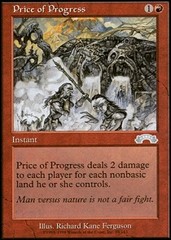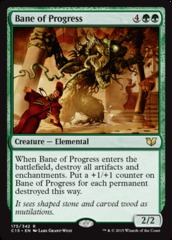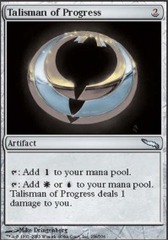The Mental Game of Magic the Gathering: Progress

The definition of insanity.
‘Doing the same thing over and over and expecting a different result.’
This is something I hold very close to my heart. Every day I have to consciously check to see if I’m going insane. This is why it’s so important to do something every day that will change your perspective tomorrow. Do something that will help you in the future, this applies to Magic and just about anything that you’re passionate about.
Losing can drive people crazy to the point of insanity. The tricky thing about Magic is that in theory you can do everything right and still lose. Over and over again. However, results do not strictly show progress.
How do we track progress in Magic?

This question is really tough. If we can’t rely on results, what can we do? Monitoring your in-game decisions is really important.
Well respected Welsh Magic player and my friend Dylan Summers was telling me about one of his games. He was playing ramp against a temur midrange deck in the current standard format. He was trading 5 damage for 2 by attacking with his World Breaker and getting hit by the opposing Servant of the Conduit. At the time he thought this was just a good deal, to trade 5 damage for 2. Later when we were talking he realised that this was not a good decision because his deck and specifically his hand, which contained lots of big spells, was very capable and almost certainly going to win a long game. Turning the game into somewhat of a race was not what he wanted to do, he should have been looking to get to the late game and take over. As it turns out Dylan did win that game. However, giving the opponent that 2 damage and leaving his World Breaker tapped gave the opponent a window of opportunity and opened up a few ways in which they could actually win the game.
Winning does not mean making all the correct decisions. Learning from this spot can help Dylan to play his ramp deck to an even higher standard in the future. It also goes beyond that, this mistake wasn’t specific to ramp. This spot highlighted Dylan’s understanding of his position in the specific game that he was playing. He was acting as the control player, wanting to make the game go longer and trading damage even when getting a good deal is not actually what he wanted to be doing.
Monitoring decisions like this is important in gaining a better understanding of how you are progressing. Consider evaluating your decisions from the past week or month. You could even set aside a certain day of the week to evaluate replays of games on Magic Online and evaluate your decisions. This is made easier if you have recorded some data that you can review.
Writing down one thing you could improve on from each match is super useful. Not only will it make you think about improving more and try and break down what you could have done differently, it will give you a resource for you to track how well you are actually progressing.
Copycat

Comparing yourself to other people can actually be a good way to track your own progress. It can also be a great way to learn. If you watch a professional Magic player, or a streamer, you can evaluate what they’re doing that you’re not. This is an incredible tool for placing your own understanding of the game and also improving.
Try and be engaged in the content that you’re watching. For example when watching a video from your favourite pro or even one of your own replays, put yourself in the game. Continually pause the recording and think what you would play and what your plan is in that game.
Positivity

Every person is unique. In everything and in Magic. Every Magic player has a variable understanding of each aspect of the game. For example I may have a better understanding than Dylan of what my role is in a given game. This helped us to break down the situation where he was playing the ramp deck.
Alternatively Dylan may have a better understanding of every other aspect in Magic, in theory. Everyone has something useful and interesting to say about Magic. When you talk to any Magic player, approach them with an open mind. I think it’s very hard, if not impossible, for someone to be ‘bad’ at Magic. This is also a really unhelpful viewpoint to hold of someone.
Wrapping up

Things to aim for:
Try and set aside some time to look over your own replays.
Have some productive Magic discussions with people you don’t know at your next Magic tournament.
Do something today that will help you tomorrow.
Thanks for reading and please leave me some feedback in the comments below! I’ll also be at GP Birmingham, please come and say hello!





